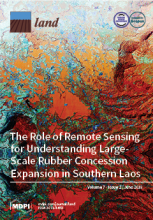Land Library
Welcome to the Land Portal Library. Explore our vast collection of open-access resources (over 74,000) including reports, journal articles, research papers, peer-reviewed publications, legal documents, videos and much more.
/ library resources
Showing items 1 through 7 of 7.Agricultural land is a limited natural resource with increasing economic value.
This article evaluates the impacts of land ownership on the economic performance and viability of rice farming in Thailand, and explores whether they are heterogeneous across different types of farming while using the propensity score matching (PSM) technique.
The ownership of agricultural land has important implications for food systems, the environment, farmer livelihoods, and rural economies, communities, and landscapes.
Statutory recognition of rural communities as collective owners of their lands is substantial, expanding, and an increasingly accepted element of property relations.
In Cambodia, the majority of the population is still composed of smallholder family farmers. 54% of the total labour force is employed in agriculture. They have access to 3.6 million ha of land, representing 19% of the country’s total land.
In this article, we argue that research on land reform in the nation of Zimbabwe has overlooked possibilities of integrating geospatial methods into analyses and, at the same time, geographers have not adequately developed techniques for this application.
A landscape perspective is generally recognized as essential for conservation biology. The main underlying reason is that species respond to features of the landscape at various spatial scales, for example habitat area, connectivity, and matrix habitats.





